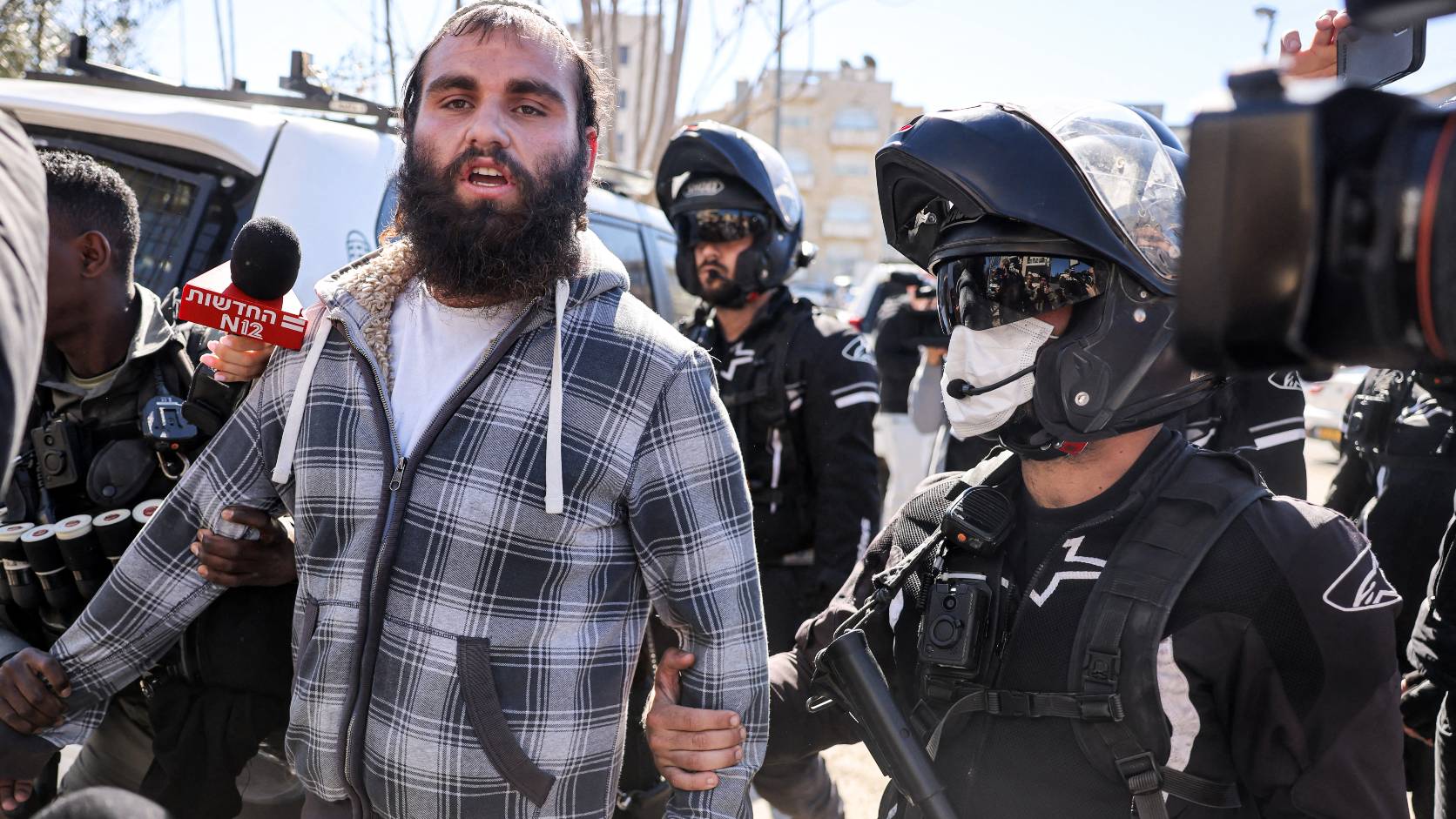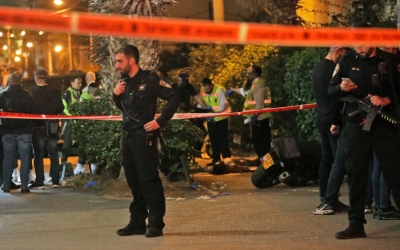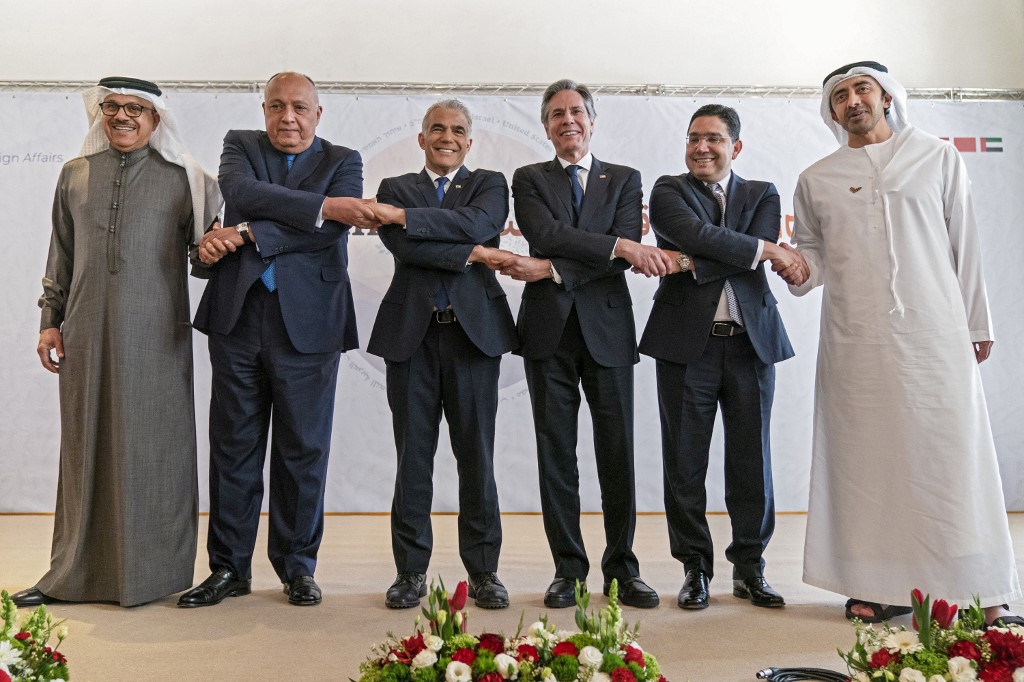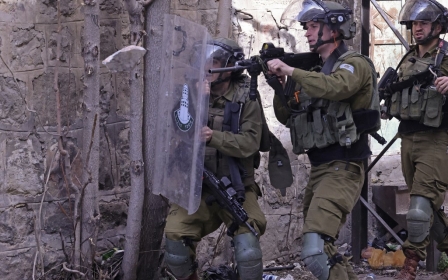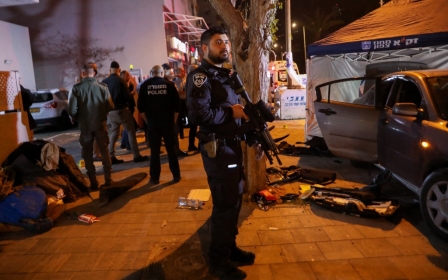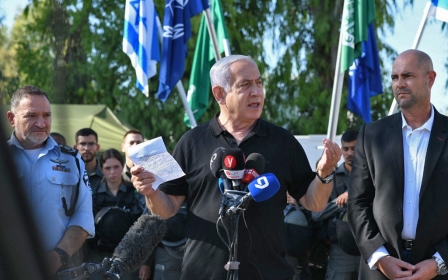Israel is stoking a civil war against its Palestinian citizens
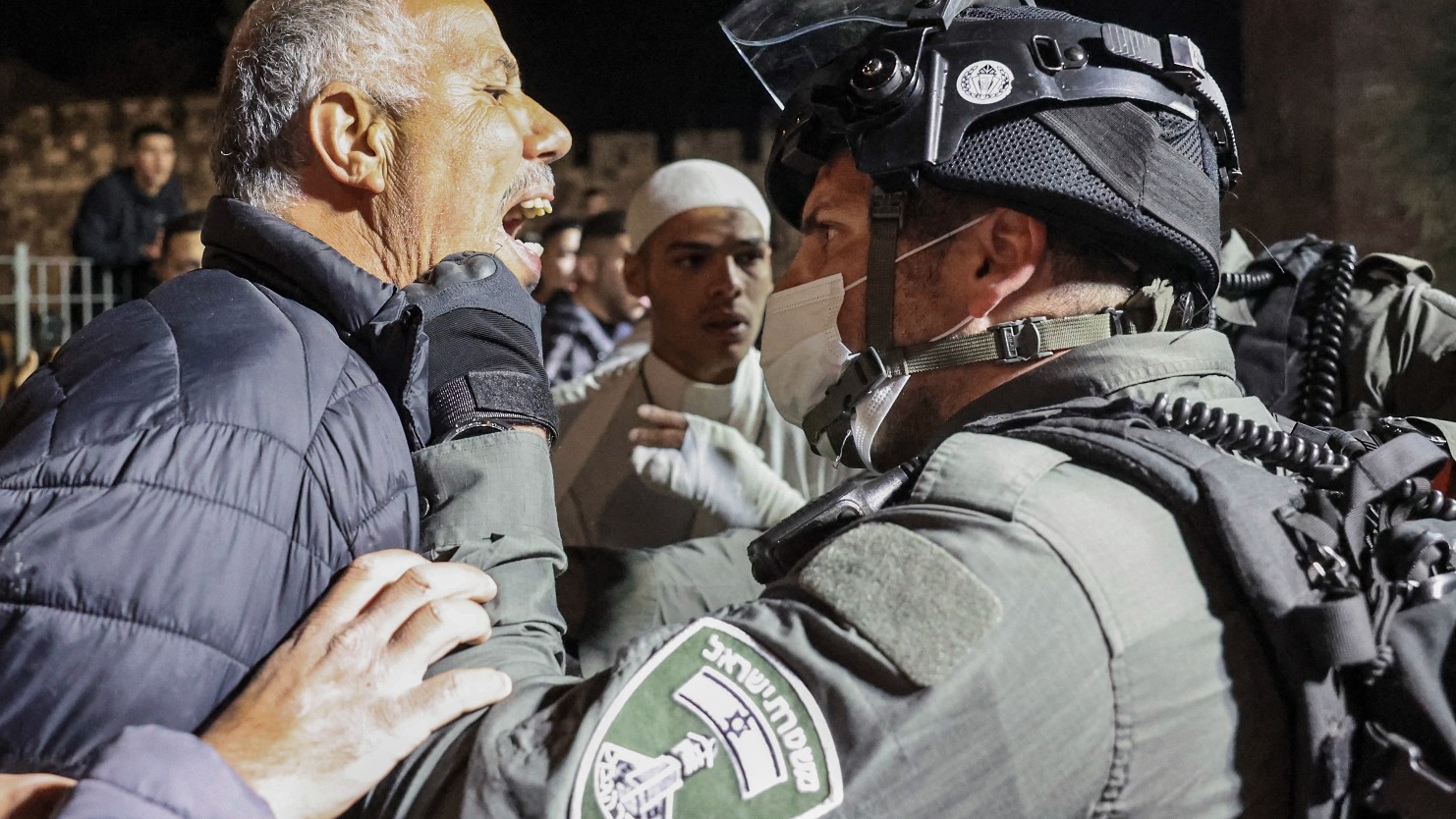
Three separate, deadly Palestinian attacks in Israeli cities in a week have elicited a predictable response. The Israeli army has drafted large numbers of extra soldiers into the West Bank and around Gaza, Palestinian territories already under decades of brutal military occupation.
But the fact that, unusually, two of the attacks were carried out by Israeli citizens - members of a large Palestinian minority whose rights are severely circumscribed and inferior to those of the Jewish majority - has raised the stakes considerably for the Israeli right.
The attacks gave Bennett the opportunity to prove his credentials to his party’s main constituency: Jewish settlers determined to drive Palestinians off their lands
A total of 11 Israelis died in the attacks a few days apart in the cities of Beersheba, Hadera and Bnei Brak, a suburb of Tel Aviv. Trigger-happy Israeli forces killed three Palestinians in separate incidents on Thursday, in the immediate wake of the attacks.
The lethal attacks were an opportunity for Naftali Bennett, the far-right leader who snatched the Israeli premiership from Benjamin Netanyahu last summer, to prove his credentials to his party’s main constituency: Jewish settlers determined to drive Palestinians off their lands and reclaim a supposed biblical birthright.
In a video statement, Bennett told "whoever has a gun licence" - meaning overwhelmingly Jewish citizens - “this is the time to carry a gun”. And if that wasn’t enough, he went on to announce that the government was considering “a larger framework to involve civilian volunteers who want to help and be of assistance”.
Street violence
What that means in practice is not hard to decipher. Nearly a year ago, the intensification of long-running moves to ethnically cleanse the Palestinian neighbourhood of Sheikh Jarrah in occupied East Jerusalem became one of the triggers for the worst inter-communal violence in Israel in at least a generation.
Palestinian citizens who staged angry demonstrations found themselves not just facing the expected crackdown from Israel’s paramilitary police, but street violence from far-right Jewish mobs that appeared to be operating in tandem with Israeli security forces.
For the first time it looked as though the Israeli leadership was moving a key feature of the occupation inside the Green Line.
In the occupied territories, armed settlers operate effectively as militias, terrorising nearby Palestinian communities, watched impassively, or sometimes assisted, by the Israeli army. They act as the long arm of the Israeli state - offering plausible deniability for Israeli officials as they exploit the settlers’ violence.
The aim of both the settlers and the Israeli state is the same: to drive Palestinians from their homes so Jewish settlers can take over the vacated land.
Last spring, the use of that same model inside Israel became harder to disguise. The Israeli government appeared to be contracting out parts of its domestic security to the same fanatical and violent settlers, allowing them to be bussed into Palestinian communities inside Israel unhindered. There they acted as vigilantes.
They smashed Palestinian shops, chanted “Death to the Arabs”, and beat up Palestinian citizens who crossed their path. At the same time, Israeli politicians from across the spectrum incited against the Palestinian minority.
Now Bennett gives every appearance of hoping to exploit the three attacks to put this earlier arrangement on a more formal footing.
Notably, a “Barel Rangers” militia has already been formed in the Negev region, in Israel’s south, where one of the attacks occurred. The founder, a former police officer, set out its purpose in a social media post: “When your life is under threat, it’s only you and the terrorist. You are the policeman, the judge and the executioner.”
Another militia has recently been established in Lod, a city near Tel Aviv, that saw the worst violence last May.
Playing with fire
Bennett’s call for "civilian volunteers" to defend the Jewish state was presumably intended to echo Ukraine’s president, Volodymyr Zelensky, who has urged Ukrainian civilians to fight the invading Russian army. Bennett may hope that in the current international climate there will be little criticism of Jewish militias acting similarly.
'If we reach a civil war situation, things will end in one word and a situation you know, which is Nakba. This is what will happen in the end'
- Uzi Dayan, Likud MK
But whereas Zelensky has called on Ukrainians to fight foreign invaders, Bennett is rallying militias to attack his country’s own citizens, based on their ethnicity. He is playing with fire, stoking a mood of civil war in which one side, Jewish Israelis, have the weapons and state resources, while the other - the Palestinian minority - is largely defenceless.
Notably, after the second recent attack in the Jewish city of Hadera on Tuesday - by two Palestinian citizens - a mob formed chanting "Death to the Arabs".
Where this might lead was underscored by a retired army general, Uzi Dayan, now a member of the Israeli parliament for Netanyahu’s Likud party. He warned all of Israel’s 1.8 million Palestinian citizens to “be careful”. They faced, he said, another Nakba, or Catastrophe - the mass ethnic cleansing of Palestinians from their homeland by Israeli militias and the army in 1948.
“If we reach a civil war situation, things will end in one word and a situation you know, which is Nakba,” he said. “This is what will happen in the end.” He added: “We are stronger. We are holding back on a lot of things.” The ethnic cleansing associated with the Nakba “was not completed”, he noted.
That is not a situation Palestinian citizens will be able to avoid if Israeli leaders will it. Many in the minority have been afraid to leave their homes, go to work or venture into Jewish areas - which is most of the country - for fear of reprisals. And that is precisely because Bennett and Dayan represent a vast swathe of opinion in Israel that views Palestinians - even Palestinian citizens - as the enemy.
The measures being “held back”, as Dayan phrased it, could include not only more state-backed violence but efforts to strip the Palestinian minority of even their degraded citizenship status.
For nearly two decades, leaders of the far-right such as Avigdor Lieberman have been calling for loyalty pledges and transfer policies to undermine the rights of Palestinian citizens. The controversial nation-state law of 2018 chipped away further at those rights. The stage has already been set for a renewed assault on citizenship.
Racist laws
Lethal attacks carried out by members of Israel’s Palestinian minority, like the two that occurred in quick succession, are rare. They are invariably carried out by what Israel terms “lone wolves”, deeply disillusioned and alienated individuals, rather than organised by Palestinian movements inside Israel.
The Palestinian minority has preferred to deal with the systematic discrimination and oppression of living as a non-Jewish population in a self-declared Jewish state using the limited legal and political tools at its disposal.
Dozens of explicitly racist laws have been challenged in the courts, even if with minimal success. The minority has increasingly lobbied the international community for help, calls that have embarrassed Israel.
Over the past year, more and more human rights and legal groups have come forward declaring that Israel is an apartheid state, both in the occupied territories and inside Israel itself. The structural discrimination exposed by the Palestinian minority has played a crucial part in helping these organisations reach such a severe conclusion.
Leaders like Bennett, therefore, have every reason to try to exaggerate the significance posed by these attacks, suggesting as he did this week that they are part of a new "terror wave". He has vowed to expand the scope of draconian administration detention orders - imprisonment without charge or evidence made public - to deal with this supposed wave.
Making the case more plausible for him, the three Palestinian citizens involved in the two attacks - in Beersheba and Hadera - had loose affiliations with the Islamic State (IS) group.
Grain of salt
But in reality, while the three perpetrators appear to have had ideological sympathy with IS - one even tried unsuccessfully to reach a training camp in Syria in 2016 - the group has no meaningful presence in the Palestinian population, either in the occupied territories or in Israel.
Identification with IS among a tiny section of the Palestinian public peaked five years ago, when the group looked like it might be offering a successful model for unseating the region’s corrupt and sclerotic Arab tyrants. IS’s failures and its brutality soon eroded even that small pool of support.
Assessments are that, despite its intensive spying and surveillance of Palestinians on social media, Israel has been able to identify only a few dozen IS supporters, who are in its prisons. Even in those cases, most have been detained because of ideological sympathy with the group, not because of tangible ties.
And in any case, IS has never expressed any pressing interest in attacks on Israel. A statement in 2016 made clear that the group prioritised struggle against Muslim governments that had, in its view, broken with the central tenets of Islam.
Islamist Palestinian factions are committed to liberating the Palestinian homeland, not trying to reinvent a mythic golden era of unified Islamic rule across the Middle East
By contrast, Islamist Palestinian factions are committed to liberating the Palestinian homeland, not trying to reinvent a mythic golden era of unified Islamic rule across the Middle East. They are Palestinian national liberation movements, not jihadists.
For that reason alone, the claim by IS of responsibility for the two attacks needs to be taken with a large grain of salt. The group has an incentive to suggest involvement in the attacks because they coincided with the arrival in Israel last week of leaders of four Arab states - Egypt, Bahrain, the United Arab Emirates and Morocco - for a summit.
These Arab states - and others waiting in the wings - wish to make Israel the linchpin of a new shared regional security and intelligence pact designed to prevent threats to their rule, including a revival of the Arab Spring.
For IS supporters, the move is yet another humiliation, and proof of the illegitimacy of the region’s Arab autocracies.
Double whammy
These attacks were carried out by lone wolves - and in one case, a pair of lone wolves - who have become increasingly desperate, angry and vengeful after decades of Israel’s oppression of Palestinians, and the complicity and betrayal by western and Arab governments.
The attackers’ surge of rage coincided with one part of the agenda of IS. But in their case, the roots penetrate much deeper.
The Palestinian perpetrators from Israel did not need indoctrination by the foreign leadership of IS to carry out their attacks. They had plenty of homegrown reasons to want to strike out - no different from the “lone-wolf” Palestinian from the West Bank who carried out a third attack near Tel Aviv but had no ties to IS.
Decades of brutal military rule in the occupied territories and systematic discrimination and oppression inside Israel were the real causes.
One cannot overlook either the double whammy from Israel against the more devout section of Israel’s Palestinian minority.
First, the best organised and most politically astute religious party in Israel, the Northern Islamic Movement under Sheikh Raed Salah, was outlawed in 2015. Israeli critics, even within the security establishment, warned at the time that the move would drive some Islamic protest underground and encourage greater extremism.
And second, the rival Southern Islamic Movement, under Mansour Abbas, threw its hand in with Bennett last summer to oust Netanyahu from power. Abbas’s party became the first to join an Israeli government, in return for a few crumbs from the far right.
Both developments have left devout Muslims who oppose Israel’s occupation and the crushing of Palestinian rights with no serious, legitimate channel for protest. They have been disempowered and humiliated - ready conditions to provoke a fringe into staging violent attacks of the kind seen in the past few days.
And to add insult to injury, Abbas’ party is supporting a government that this week allowed a virulently anti-Palestinian legislator, Itamar Ben Gvir, to tour the sacred Muslim holy site of al-Aqsa in Jerusalem under heavily armed protection. Ben Gvir wants the mosque plaza under Jewish sovereignty.
Wrong lesson
There is a lesson here that Israel willfully ignores, just as the western states who serve as its patron do too.
The West’s unlimited support for Israel, and the Arab autocracies that are now openly cosying up to Israel, has a cost
If you treat populations with structural violence, if you strip them of rights, if you demean and humiliate them, and if you deny them a voice in their future, you cannot be surprised - even less maintain a self-righteousness - when some lash out with their own forms of violence against you.
The wrong, self-serving lesson Israel will learn - as it has for decades - is that the correct response must be greater violence, greater humiliation, and an intensified demand for submission. The oppression will continue, as will the resistance.
The West’s unlimited support for Israel, and the Arab autocracies that are now openly cosying up to Israel, has a cost. Dismissing it as simply the savagery of IS may offer reassurance. But it will not stop the pressure from building - or the explosion to come.
The views expressed in this article belong to the author and do not necessarily reflect the editorial policy of Middle East Eye.
This article is available in French on Middle East Eye French edition.
Middle East Eye propose une couverture et une analyse indépendantes et incomparables du Moyen-Orient, de l’Afrique du Nord et d’autres régions du monde. Pour en savoir plus sur la reprise de ce contenu et les frais qui s’appliquent, veuillez remplir ce formulaire [en anglais]. Pour en savoir plus sur MEE, cliquez ici [en anglais].



